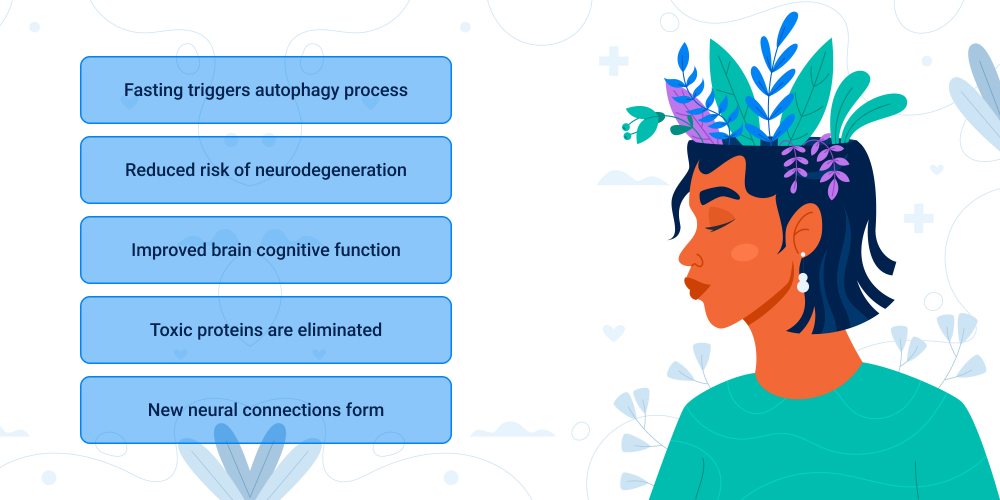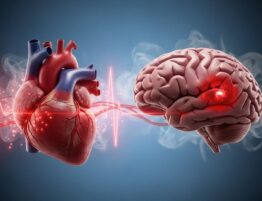For improved brain and nervous system function, proper nutrition is essential, focusing on the intake of key nutrients, vitamins, and minerals. Today, intermittent fasting is gaining popularity and momentum. This method of fasting has been validated by scientists and researchers for improving bodily functions. It improves the metabolic process and promotes better brain function. Thanks to this method of fasting, a person can lose weight, feel good, and improve their overall health.
Each of us has our own diet and meals. This fasting method follows a specific pattern. For 16 hours, a person abstains from food, and for 8 hours, they eat. Studies have shown that this method has a good effect on cognitive abilities and brain health. The fasting method helps to restore neurons and may reduce the impact of stress. A person feels healthy during the day, and the risk of various diseases is reduced. The person’s neurological health improves. Fasting causes reactions that increase brain plasticity. Intermittent fasting is a great way to improve your condition and prevent neurological problems.
How Intermittent Fasting Enhances Cognitive Function
Cognitive function significantly affects our awareness and understanding of the world around us. To improve your abilities, it is essential to consider some points. Fasting is an excellent example of how to improve cognitive function. Intermittent fasting improves its functioning and promotes cellular repair. Thanks to fasting, the brain’s resistance to any factors, such as stress, improves.
- An essential mechanism of cognitive benefits is the metabolic switch. The body stores energy in the form of glucose. During intermittent fasting, glucose leaves the body, and there is almost no glucose left. At this time, the body produces unique ketone bodies that are a source of energy. This alternative energy source helps the brain function more efficiently. These metabolic effects are integral to neuronal health. They improve neuroplasticity and support long-term memory.
- Fasting has a significant effect on memory and cognitive abilities. A person becomes more focused and concentrated on a particular problem. Fasting increases the protein in the brain that supports neuronal growth and diversity. For a while, fasting helps to improve a person’s mood and overall well-being. The way fasting works has a long-term effect on cognitive function. A person experiences not only positive changes in the neurological state but also in the physical state. They can lose weight and improve their overall body condition.
- An integral part of the impact of fasting is the improvement of the mind. Fasting has a powerful effect on mental clarity. During fasting, many people report that mental clarity improves and brain fog diminishes. Often, the reduction in blood sugar helps to improve the mind and thinking. Stabilizing essential factors in the body is an integral part of human health. A person can improve their sleep and feel very good for a long time.
Neuroprotection: How Fasting Protects the Brain
Research into neuroprotection is playing a key role today. Neuroprotection refers to specific strategies for protecting brain function. It helps to preserve cell structure in the brain and reduce aging. Often, it is an integral part of reducing injuries or various neurological diseases. Neuroprotection involves enhancing the brain’s natural defense mechanisms. With proper neuroprotection, some aspects of aging may slow down and certain problems can be reduced. The risk of cognitive decline may be decreased.
- The process of fasting has a positive effect on the brain as a whole. Reducing the amount of glucose and using ketone bodies improves a person’s energy. As a result, many people experience improved energy levels and mood. The process is characterized by a reduction in various diseases and an improvement in anti-inflammatory effects. A potential advantage is the reduced risk of neurodegenerative diseases and improved overall health.
- Intermittent fasting is an integral part of protein production in the brain. Protein is essential and supports the new growth of neural connections. Neuronal repair helps improve memory, concentration, and overall awareness. A person becomes more resilient and can learn well. Their improved concentration enhances their ability to process information. Thanks to neuroprotection, the risk of Parkinson’s disease or Alzheimer’s disease is reduced.
- Fasting triggers cellular cleansing processes. These processes help remove damaged components that would otherwise break down. Fasting is beneficial for maintaining optimal brain function. Fasting improves and promotes autophagy, which is called cellular cleansing. Reducing inflammation and enhancing this condition helps to repair the brain. It becomes more resistant to environmental factors and any stress and inflammation. Fasting plays a key role in long-term brain function. A person feels more energized and reduces the risk of illness.
The Role of Autophagy in Brain Health During Fasting
During fasting, the body can break down and recycle damaged cellular components. Autophagy refers to a natural cellular process that performs these functions. Often, self-cleaning of the cell is essential for the overall health of the human body. Brain function is supported through the removal of abnormal and toxic proteins. Cell renewal and the formation of neural connections play an essential role. As a result, a person feels good and has a good supply of energy and strength.
- Autophagy is involved in the protection of neurons during aging and life. During fasting, the body reduces harmful substances that negatively affect the brain. These substances can cause serious neurodegenerative diseases. When the process is disrupted, proteins that have a toxic effect are constantly accumulating. They have a significant impact on brain function and damage its functionality. Often, the process can cause cognitive imbalance and slowing down in thoughts.
- Intermittent fasting helps to prolong youthfulness and preserve the overall health of the body. During fasting, a person can lose a little weight and improve their overall health. Fasting is one of the best ways to stimulate a critical process. Often, during fasting, the body does not receive some nutrients. The process involves recovery, improvement, and the activation of autophagy. In essence, the body cleanses its internal structures and restores its natural balance.
- Improving this process helps to maintain essential brain cells so that they remain stable, healthy, and function properly. As a result, the person feels good and has a low risk of neurodegenerative diseases. Brain function typically remains robust and healthy. New connections are created, and the process of recovery from specific stress takes place. The brain becomes less sensitive to various triggers and environmental factors.
- Autophagy is the best mechanism for rejuvenating the brain during fasting. Intermittent fasting helps to maintain health and increase resistance to disease. The long-term effect has an excellent benefit for cognitive balance and memory. The brain typically becomes less sensitive to various triggers and functions more efficiently. As a rule, during this state, a person can learn well and have a developed memory.
Metabolic Effects of Intermittent Fasting and Their Impact on the Brain
Fasting has a significant impact on metabolic changes in the human body. Often, the changes are for the better to reduce a person’s weight and improve their overall health. Fasting has a significant impact on brain function and cognitive health improvement. Metabolic effects help to achieve good results for both health and body composition. The body can adapt to different periods of fasting. It uses energy and participates in the regulation of hormones. The process is characterized by improving general condition and brain health.
- An essential change in the metabolic process during fasting is insulin sensitivity. It improves, and a stable glucose level in the body is restored. When a person is not fasting, the brain uses glucose and stable sugar levels. It maintains constant brain and cognitive function. During fasting, the process takes on a different meaning. Regulation of glucose levels reduces the risk of diabetes and certain types of diseases. The process often helps to restore cognitive abilities and general condition.
- The metabolic effects include ketone metabolism. When there is almost no glucose in the body, a new process begins. Ketone metabolism helps to improve brain function. It energizes the brain and helps reduce oxidative stress. Brain inflammation does not occur due to the correct fasting process. The risk of degenerative diseases and their consequences is reduced. A person also feels healthier and avoids the risk of premature aging.
- During fasting, metabolic effects have many other benefits. One of them is the release of neurotrophic factors. They support neuronal growth and brain plasticity. The changes are characterized by the preservation of cognitive abilities, memory, and intelligence. During aging, a person remains healthy and in excellent condition. Improved metabolism contributes not only to metabolism but also to general health. It provides the brain with the necessary substances for good performance and work.
Mental Clarity and Focus: The Immediate Benefits of Fasting
Fasting on a regular basis improves mental clarity and concentration. Taking time and attention for one’s health is essential for each of us. Even occasional fasting can lead to noticeable improvements in mental clarity and concentration. Many people find their thinking becomes clearer and more efficient. They can manage their time better and experience cognitive improvement.
- During the intermittent fasting process, the brain receives the necessary energy for its work, and the body loses glucose and switches to the production of ketone bodies. Ketone bodies help to provide energy to the whole body and are a powerful source for the brain. The brain cells undergo a process of improving energy metabolism. Often, a person feels improved thinking, concentration, and mental clarity.
- A significant advantage of fasting is the reduction of insulin levels and the stabilization of sugar levels. Blood sugar at the proper level helps to improve brain function. A person comes out of the stage of fogginess and ambiguity. Increasing the production of suitable substances and neurotransmitters helps to improve one’s condition. A person has a better attention span and is more focused in some stages of life. They can improve their cognitive abilities within a short time.
- The short-term benefits of fasting are integral to health. The person gets the necessary nutrients and reduces glucose levels. The process is perfect for cleansing and repairing the brain. Short-term fasting on a regular basis helps to restore mental clarity. Changing your daily routine and getting healthy sleep are essential for a person’s life. They can feel more productive and have more energy. The process can be beneficial for many people and may slow signs of aging.
The Long-Term Neurological Benefits of Intermittent Fasting
Intermittent fasting helps to strengthen the body and brain. The method is highly effective in improving clarity, concentration, and memory. The long-term benefits of fasting can contribute to overall health improvement. They have a significant impact on neurological health and its improvement. Fasting may support brain health as we age and potentially slow certain aspects of the aging process. It improves a person’s cognitive abilities and mental capacity. Here are the main long-term benefits of fasting, including the impact on brain health:
- A significant benefit that is extremely important for everyone is disease prevention. Fasting helps to delay or prevent neurodegenerative diseases. It activates key cellular processes that support bodily health. Damaged proteins are repaired, and oxidative stress on the brain is reduced. Fasting helps to cleanse the body and rid it of toxic substances.
- Neuroprotection is very much related to fasting. Fasting promotes new neuronal connections and improves brain functionality. Certain vital proteins in the brain, which increase during fasting, promote neuronal survival and growth. We experience good memory and concentration due to stable processes in the brain.
One of the benefits of fasting is that it triggers metabolic improvement. Metabolic effects are characterized by a reduction in chronic inflammation and oxidative stress. Decreased insulin sensitivity, which fasting helps prevent, can contribute to serious illness. Fasting stabilizes blood sugar and reduces the effects of glucose on the body. The brain becomes more stable, efficient, and adaptive to certain factors. A person may experience improved mental acuity, better memory, and enhanced cognitive function.













Please, leave your review
Write a comment: